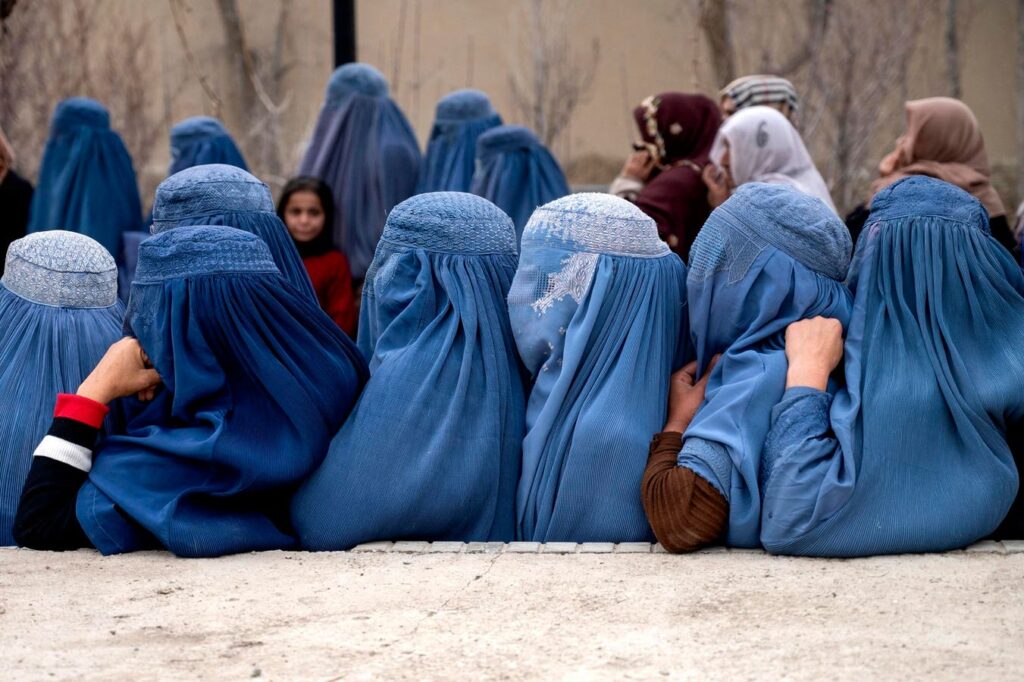Afghan burqa-clad women wait in a queue to receive a free iftar meal during the Islamic holy fasting … More
AFP via Getty ImagesRecent months have seen several reports of funding cuts and visa withdrawals leaving Afghan women at risk of deportation to Afghanistan – a country where women and girls are subjected to what only can be described as gender apartheid.
Among others, in January 2025, Trump’s administration halted visa processing for refugees. All refugee travel to the U.S. was to be cancelled. This included the travel of nearly 1,660 Afghans cleared to resettle in America – including many women and girls who were facing serious risk upon return. In April, it was further announced that thousands of Afghans eligible for temporary protected status would lose it in May – putting them at risk of deportation.
In March, reports suggested that more than 80 Afghan women studying in Oman on US-funded scholarships may lose their funding and be forced back to Afghanistan. The Afghan women were pursuing graduate and post-graduate degrees under the Women’s Scholarship Endowment (WSE), a USAID program launched in 2018 to fund studies in science, technology, engineering and mathematics. Reportedly, end of February 2025, the 80 Afghan women were informed their scholarships were ending and that they would be sent back to Afghanistan. The US State Department later confirmed that the funding ends on June 30, 2025. It is unclear what will happen after that date.
All these developments sent chills down these women’s spines. Why do Afghan women and girls fear being sent back to Afghanistan? The situation of women and girls in Afghanistan is without parallels. As it stands, there is no other country in the world where women and girls would be stripped of all their human rights one by one, and removed from all aspects of the society.
Over the last three years, the Taliban introduced tens and tens of decrees barring women and girls from all activities and engagements outside their homes, whether education, employment, travel without mahram, or going to parks, among others. The restrictions are further enshrined in the Law on the Promotion of Virtue and the Prevention of Vice. Article 13 of the law imposes that it is mandatory for a woman to veil her body at all times in public. A face covering is said to be essential. This is to avoid temptation and tempting others. Women are to cover themselves in front of non-Muslim males and females. A woman’s voice is deemed intimate, and as such, women are not to be heard singing, reciting, or reading aloud in public. Women are not allowed to look at men they are not related to by blood or marriage and vice versa. Article 19 bans the playing of music, and the transportation of solo female travelers, among others.
The Taliban, the de facto authorities in Afghanistan, are said to be working to resolve the issue of women’s education. However, more than three years later, no progress has been made on the issue. At the same time, the Taliban justify the ban as in accordance with Islamic Sharia law – and as such – make it very clear that no change is to come. The Taliban are also silent on the other restrictions and whether there is any chance of removing them.
The draconian rules imposed upon women and girls in Afghanistan are strictly enforced with those objecting being threatened, beaten, detained and subjected to inhuman and degrading treatment in detention.
Afghan women globally, as supported by Iranian women and international experts, have been calling to recognize the treatment of women and girls in Afghanistan as gender apartheid – a system of institutionalized gender segregation and discrimination, which seeks to establish and maintain dominance by men over women in the country – as visible with every decree and law introduced by the Taliban.
Gender apartheid requires comprehensive responses, including pressure from international actors through shaming and severing diplomatic and economic relations, the same was as it was done in response to apartheid in South Africa. Comprehensive responses also include steps towards justice and accountability and assistance to women and girls (in Afghanistan and abroad). While important steps towards justice and accountability are being taken globally, including with the International Criminal Court (ICC) and the International Court of Justice (ICJ), assistance to women and girls continues to decrease – as many countries reduce their foreign aid commitments and close their borders. It is key to re-consider the approaches taken to date and ensure that responses are adequate to address the issue at stake. And at stake are the present and the future of women and girls in Afghanistan.
Read the full article here


